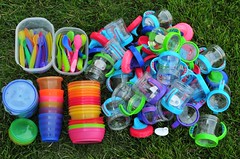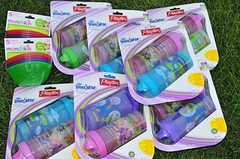I've been hearing the news about a potentially harmful substance called BPA (Bisphenol A) in plastics for a while now, but have pretty much buried my head in the sand. We stopped microwaving in plastic, but that was about the only change made in our household. I don't know why -- probably because I expected the hubbub to die down and even newer research to come along and disprove the scary stuff. I also kept seeing all of our plastic brands on the store shelves and assumed (incorrectly) that "they" wouldn't still sell the stuff if there was anything wrong with it.

Well I finally did a little research this week and was chagrined to find out that the Gerber sippy cups we use for the girls are on the "bad" list and have BPA in them. These cups are in heavy rotation at our house -- they're the ones the girls drink water from all day long, the ones we previously microwaved milk in three times a day, and the ones the girls keep by their beds with water for the midnight thirsties. Crud. For the record, Gerber's still selling this line of sippies and says kind of vaguely on its web site that the company is "committed to offering all BPA-free products by the end of 2008." Nice...
So it's out with the old and in with the new. As of yesterday, the girls are drinking and eating only from BPA-free plastics. Most of our spoons, plates, and bowls checked out ok, but we have a pretty humongous pile of sippies (24 I think) that are slated for the recycling bin.
If you haven't been following this story (like me), here's what I found:
What is BPA?: Bisphenol A, commonly abbreviated as BPA, is a chemical that's widely used in plastics for toys, sippy cups, bottles, and teethers.
What's the concern?: This story on the
Sixwise website put it pretty succinctly: "The problem is that BPA can leach out of plastic during everyday use, causing health problems. Most notably, BPA mimics the female hormone estrogen and may affect fertility and promote cancer." Also, the stuff leaches out of the plastic something like 55 times faster, according to
Scientific American, when you put hot liquids in it. And it's made worse if you expose the plastics to heat (microwave or dishwasher) or let food sit in the containers for a long time. (All of which I shamefully admit that we were doing... ugh.)
Is BPA new?: Nope it's been around, and been the subject of back-and-forth controversy, for a while now. But the issue recently vaulted into the public eye when a bunch of agencies started making a stink of their findings.
Wikipedia says "Suspected of being hazardous to humans since the 1930s, concerns about the use of Bisphenol A in consumer products grabbed headlines in 2008 when several governments issued reports questioning its safety, and some retailers pulled products made from it off their shelves."
How do you tell if your stuff has BPA? There are a few different ways to play detective:
- Web Check: Look up your specific brands on the internet. The most thorough list I've found so far is the Z-Report on BPA. They categorize their lists of manufacturers as excellent, good, fair, and poor. Scroll around and click on a manufacturer's name to find out which of their products have BPA and which don't.
- Recycling Number: Check the recycling symbol and number on the bottom of your product. There are seven classes of plastics, and #7 and #3 are the ones in question. The other classes (1, 2, 4, 5, 6) don't contain any form of BPA, and therefore have no risk of BPA ingestion.
- Product Packaging: Buy stuff that has "BPA-free" on the packaging. I was just in Target replacing our stash and noticed that about half of the sippy cups were now marked BPA-free.

Well anyhow, that's the gist of it. And that's why I (finally) spent some time doing research and about $75 dollars replacing potentially "bad" plastics in our kid drawer. It might turn out to be unnecessary, but it's a pretty small price to pay for peace of mind and I wish I'd done it earlier.
 Well I finally did a little research this week and was chagrined to find out that the Gerber sippy cups we use for the girls are on the "bad" list and have BPA in them. These cups are in heavy rotation at our house -- they're the ones the girls drink water from all day long, the ones we previously microwaved milk in three times a day, and the ones the girls keep by their beds with water for the midnight thirsties. Crud. For the record, Gerber's still selling this line of sippies and says kind of vaguely on its web site that the company is "committed to offering all BPA-free products by the end of 2008." Nice...
So it's out with the old and in with the new. As of yesterday, the girls are drinking and eating only from BPA-free plastics. Most of our spoons, plates, and bowls checked out ok, but we have a pretty humongous pile of sippies (24 I think) that are slated for the recycling bin.
If you haven't been following this story (like me), here's what I found:
What is BPA?: Bisphenol A, commonly abbreviated as BPA, is a chemical that's widely used in plastics for toys, sippy cups, bottles, and teethers.
What's the concern?: This story on the Sixwise website put it pretty succinctly: "The problem is that BPA can leach out of plastic during everyday use, causing health problems. Most notably, BPA mimics the female hormone estrogen and may affect fertility and promote cancer." Also, the stuff leaches out of the plastic something like 55 times faster, according to Scientific American, when you put hot liquids in it. And it's made worse if you expose the plastics to heat (microwave or dishwasher) or let food sit in the containers for a long time. (All of which I shamefully admit that we were doing... ugh.)
Is BPA new?: Nope it's been around, and been the subject of back-and-forth controversy, for a while now. But the issue recently vaulted into the public eye when a bunch of agencies started making a stink of their findings. Wikipedia says "Suspected of being hazardous to humans since the 1930s, concerns about the use of Bisphenol A in consumer products grabbed headlines in 2008 when several governments issued reports questioning its safety, and some retailers pulled products made from it off their shelves."
How do you tell if your stuff has BPA? There are a few different ways to play detective:
Well I finally did a little research this week and was chagrined to find out that the Gerber sippy cups we use for the girls are on the "bad" list and have BPA in them. These cups are in heavy rotation at our house -- they're the ones the girls drink water from all day long, the ones we previously microwaved milk in three times a day, and the ones the girls keep by their beds with water for the midnight thirsties. Crud. For the record, Gerber's still selling this line of sippies and says kind of vaguely on its web site that the company is "committed to offering all BPA-free products by the end of 2008." Nice...
So it's out with the old and in with the new. As of yesterday, the girls are drinking and eating only from BPA-free plastics. Most of our spoons, plates, and bowls checked out ok, but we have a pretty humongous pile of sippies (24 I think) that are slated for the recycling bin.
If you haven't been following this story (like me), here's what I found:
What is BPA?: Bisphenol A, commonly abbreviated as BPA, is a chemical that's widely used in plastics for toys, sippy cups, bottles, and teethers.
What's the concern?: This story on the Sixwise website put it pretty succinctly: "The problem is that BPA can leach out of plastic during everyday use, causing health problems. Most notably, BPA mimics the female hormone estrogen and may affect fertility and promote cancer." Also, the stuff leaches out of the plastic something like 55 times faster, according to Scientific American, when you put hot liquids in it. And it's made worse if you expose the plastics to heat (microwave or dishwasher) or let food sit in the containers for a long time. (All of which I shamefully admit that we were doing... ugh.)
Is BPA new?: Nope it's been around, and been the subject of back-and-forth controversy, for a while now. But the issue recently vaulted into the public eye when a bunch of agencies started making a stink of their findings. Wikipedia says "Suspected of being hazardous to humans since the 1930s, concerns about the use of Bisphenol A in consumer products grabbed headlines in 2008 when several governments issued reports questioning its safety, and some retailers pulled products made from it off their shelves."
How do you tell if your stuff has BPA? There are a few different ways to play detective:
 Well anyhow, that's the gist of it. And that's why I (finally) spent some time doing research and about $75 dollars replacing potentially "bad" plastics in our kid drawer. It might turn out to be unnecessary, but it's a pretty small price to pay for peace of mind and I wish I'd done it earlier.
Well anyhow, that's the gist of it. And that's why I (finally) spent some time doing research and about $75 dollars replacing potentially "bad" plastics in our kid drawer. It might turn out to be unnecessary, but it's a pretty small price to pay for peace of mind and I wish I'd done it earlier.




